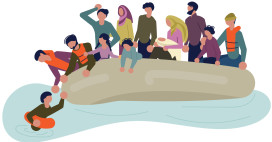
On this page
No Fair Trial, No Justice: How I spent five years in prison
The European Impacted Persons Advisory Council (EIPAC) is an advisory committee composed of people with lived experience in various aspects of the criminal legal system who are committed to supporting the reform of the system. Formed in 2024 as an advisory body to Fair Trials Europe, EIPAC ensures that the voices of impacted persons shape policies, campaigns, and the Fair Trials advocacy efforts. This is “EIPAC Voices: Stories of Lived Experience in Justice Reform” a monthly blog series, introducing EIPAC members and their personal experiences. Our first writer, Tasos Theofilou.
My name is Tasos Theofilou. I was born in Thessaloniki in December 1982. Since October 2024, I am one of the members of the newly formed Fair Trials’ European Impacted Person Advisory Council (EIPAC). Today, I’m going to tell you the story of how I ended up being an impacted person by the failures of the justice system.
The Transfer to Domokos Prison. Athens – Domokos, August 2012
Inside the anti-terrorism jeep sat my four police guards in civilian clothes, their faces covered by full face masks, and bulletproof vests around their body. Surrounding us by land and sky were ten escort vehicles and a helicopter.
Seven days in an antiterrorism department, handcuffed so tightly that I could no longer feel the pain in my wrists. I knew we were heading to Domokos prison. I had run the gamut of the criminal code: manslaughter, robbery, and membership in a terrorist organization. Domokos would be my home for several years, though I held onto the hope that it wouldn’t be too many. The car drove for dozens of kilometers through the mountains of Central Greece. After a while, I saw the building emerge from nowhere, set against a bare landscape. It seemed insignificant compared to the vast expanse of the territory.
A feeling of sorrow, rooted deep in my chest, matched the rhythm of my heartbeat. There, standing in front of the main doors, something paradoxical happened, I felt redemption. I was finally free from the absolute and abusive power of the police, surrendering instead to another force, milder, but still controlling: the correctional system. From psychological and physical violence to incarceration and surveillance. At least here, I could have shoelaces and clean sheets on my bed.
The Interrogation. Athens, August 18-25, 2012
Sixty minutes passed. My refusal remained intact, so the ‘you’ll be fucked’ stormed into the office. A group of men pulled down my pants and underwear, mocking me, asking if I had shaved my ass. They punched and kicked me until I lost my balance and fell. At that moment, they stepped on me with all their strength. Then, they lifted me from the floor, placed me on a stool behind a desk, and tied my hands so tightly that I started to feel the pain spreading through my entire body. Afterward, they locked me in a cell.
I arrived at that cell completely battered from the interrogation and with no sleep. It was a narrow space, one meter wide and three meters long, with a dirty mattress on the floor. There was no natural light, only a lamp that never switched off. I lost all sense of time; I couldn’t tell if it was morning or evening. Every time I tried to sleep, someone opened the door, cursed and threatened me. This happened every three minutes for approximately a day, I think. Honestly, I am not sure. After eight hours, I lost the ability to count.
The next day, things calmed down. I was finally given water, food, and allowed to sleep. The only times I left the cell were for court hearings, where I was formally presented with charges.
A few days earlier, there had been a bank robbery on Paros Island. During their escape, the perpetrators shot and killed a man who tried to stop them. One of the robbers had dropped a hat, and they claimed my DNA was on it.
I had never been to Paros.
They also accused me of being a member of a terrorist organization. The truth? I was a friend of some of the falsely accused and merely an acquaintance of others.
There, standing in front of the main doors, something paradoxical happened, I felt redemption. I was finally free from the absolute and abusive power of the police, surrendering instead to another force, milder, but still controlling: the correctional system. From psychological and physical violence to incarceration and surveillance.
Passing through the prison door. Domokos, August 25, 2012
Pre-trial detention after police custody feels like a funeral. Entering prison, on the other hand, is a baptism, a transitional ceremony.
Upon arrival, prisoners are forced to remove their clothes and stand facing the prison officials. This is where the baptism begins. Instead of water, they use air to inspect and cleanse your inner demons. Positioned in a deep squat, prisoners must cough to ensure nothing is hidden inside their rectum. I am convinced that the true purpose of this mandatory coughing is not just security, but to expel some demon of crime or perhaps even the last bubble of dignity still hiding somewhere in their lungs.
After this ritual, you descend into a new life.
I shared my first cell in prison with two other men who helped me settle in. One day, over lunch, my two cellmates eagerly ate the bean soup and olives served. One of them said: “It’s been like this for a week. They only show you.”
He was referring to the news on the muted TV. The images showed me in handcuffs at the court. The caption reported that I had arrived at Domokos prison.
The First Trial. Athens, 2013-2014
“In the first instance, they judge for the police. In the appellate court, they judge for the accused” the prisoners told me. Thanks to them, I had no high expectations.
The eyewitnesses did not identify me as one of the perpetrators, and the hat, allegedly with my DNA, did not appear in any of the crime scene photographs. It was seized hours later and only arrived at the Athens headquarters days afterward.
More importantly, the report that claimed a genetic match with my saliva failed to specify what type of tissue it had been compared to. Supposedly, they had analyzed tissue from the hat—but they couldn’t even determine what kind. Was it blood, sweat, semen? They had tested the air. It was nothing more than sleight of hand.
The court dismissed all of this and sentenced me to 25 years. Some said I was smiling when I heard the verdict, assuming it was an ironic smile. But in that moment, I felt a huge sense of relief. I had just completed a cycle in which I had managed to prove my innocence to the observing society. The prisoners’ collective wisdom had been confirmed, at least in the first part. Now, I only had to wait a few years for the rest to come true.
A group of men pulled down my pants and underwear, mocking me, asking if I had shaved my ass. They punched and kicked me until I lost my balance and fell. At that moment, they stepped on me with all their strength. Then, they lifted me from the floor, placed me on a stool behind a desk, and tied my hands so tightly that I started to feel the pain spreading through my entire body. Afterward, they locked me in a cell.
The Acquittal. Korydallos Prison, Athens, June 2017
I had just been acquitted, and I didn’t care. For the first time on the way back from court, my stomach didn’t turn.
Noon would bring freedom. I just had to wait until then for the paperwork to be sorted out.
I returned to my cell, took my phone from its hiding place, and started making arrangements for my release. I sat down, smoking, lost in time. After a while, my friends burst into my cell, shouting that I had been released! I hadn’t heard the announcement.
I gave my phone to a friend, my sneakers to a fellow inmate in need, took my duffel bag, and walked through corridors of the prison leading to administrative buildings I hadn’t known existed. I reached the last door, pressed the button, it opened, and I stepped outside. It smelled like summer.
As soon as my foot touched the sidewalk, five years condensed into a single moment. A moment that should not be wasted but rather marked a milestone in the quest for a better criminal justice system in Europe.
Article written by Tasos Theofilou, Fair Trials’ EIPAC member and writer.
Article edited by Ángela Rodríguez, Fair Trials’ Communication Officer.
As part of our commitment to centering impacted voices, Fair Trials will feature a monthly blog series, “EIPAC Voices: Stories of Lived Experience in Justice Reform” introducing EIPAC members and their personal experiences. These stories highlight the human cost of justice system failures while reinforcing the need for fairer, more rights-based approaches to justice.


